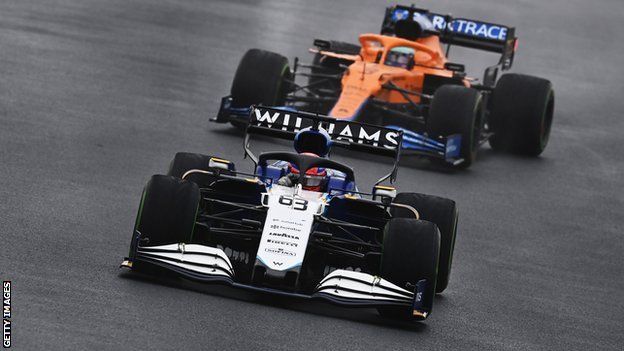Formula 1: Williams pledge to be climate positive and sustainable by 2030
- Published

The introduction of sustainable fuels is a key part of a strategy for the whole of F1 to be net-zero carbon by 2030
Williams have committed themselves to becoming climate positive by 2030 as part of a new sustainability strategy for the Formula 1 team.
And Williams have become the first F1 team to sign up to the United Nations Sports for Climate Action Framework.
Climate positive means an organisation is removing more carbon from the atmosphere than it is producing.
Chief executive officer Jost Capito said Williams would be "developing advanced technology to meet this goal".
He added: "We wanted to push the envelope and be the pace setter for sustainability in global motorsport and in the wider automotive industry."
Williams' advanced engineering business, which seeks to apply F1 expertise in wider society, has already developed and sold technologies to reduce the energy consumption of supermarket fridges by application of aerodynamic theory.
"F1 has the power to inspire millions of people across the world and, as the pinnacle of so many advanced technologies, F1 has the ability to create technical solutions to help tackle the challenges we face as a planet," said Capito.
"As we progress towards our goal to be climate positive in the years ahead, my hope is that Williams Racing can inspire all those connected with our sport and beyond, using motorsport as a catalyst for significant and long-lasting change."
Williams' goals range from reducing carbon emissions from travel and energy consumption at their factory to creating its own energy and developing carbon-capture technologies
The United Nations Framework Convention on Climate Change head of sector engagement in climate action Lindita Xhaferi-Slihu, said: "(Williams's actions are) sending a clear signal on the growing importance of setting clear climate targets and of using the sport and technologies as a catalyst for change. We look forward to working together with Williams Racing to deliver on the goals of the Framework."
Williams is just the latest F1 team to develop a sustainability plan - for example world champions Mercedes' team has had a net-zero carbon footprint since 2020, external and British-based McLaren have pledged to be net-zero by 2030, external.
F1 as a sport has made the same commitment, and is working on a plan to introduce fully sustainable fuels alongside the introduction of a new engine design in 2025 or 2026.